CHRO’s Engagement with the United Nations (UN) Human Rights System
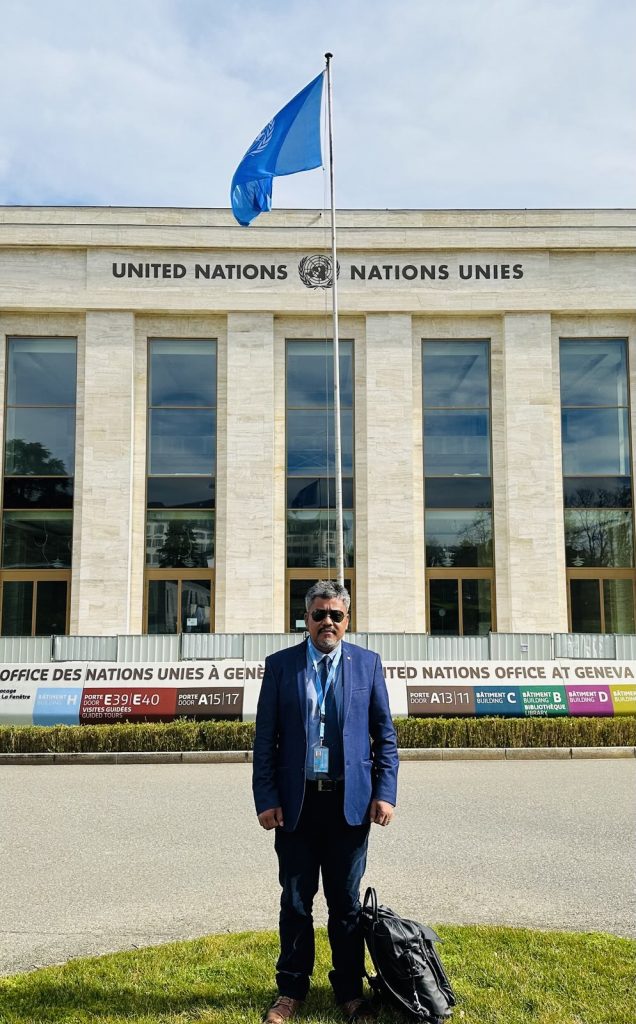
The Chin Human Rights Organization (CHRO) has been a leading advocate for the rights of the Chin people and other marginalized communities in Burma/Myanmar, consistently engaging with the United Nations (UN) human rights system. Over the past three decades, CHRO’s engagement has evolved to encompass a wide range of UN mechanisms, including the UN Working Group on Indigenous Populations, the Permanent Forum on Indigenous Issues, the Human Rights Council, Special Procedures, Special Rapporteurs, the Universal Periodic Review (UPR), and the Independent Investigative Mechanism for Myanmar (IIMM). Additionally, CHRO has worked closely with the International Labour Organization (ILO) on forced labor issues, particularly in relation to Myanmar’s military abuses. The organization’s ECOSOC Special Consultative Status has further amplified its ability to participate in and influence global human rights advocacy.
1. Engagement with the UN Working Group on Indigenous Populations (WGIP) and Permanent Forum on Indigenous Issues (PFII)
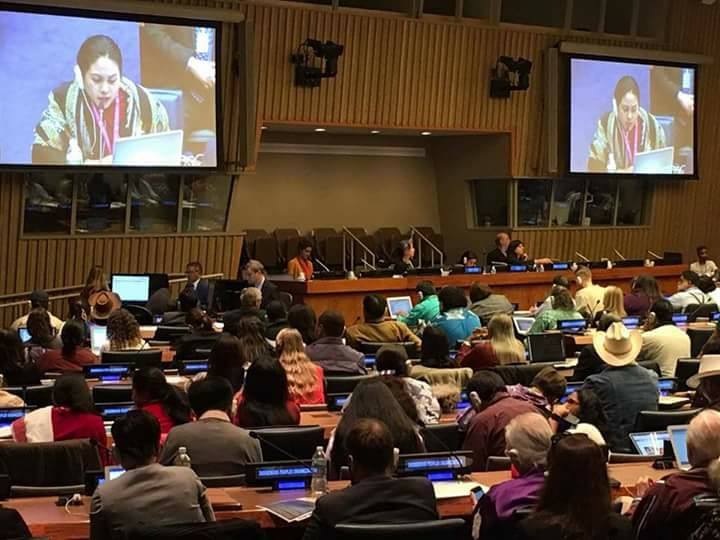
CHRO’s initial involvement with the UN human rights system began through forums focused on indigenous peoples’ rights, reflecting the Chin people’s identity as an indigenous community.
- 1999–2000s: CHRO began engaging with the UN Working Group on Indigenous Populations (WGIP) to raise awareness about the human rights violations faced by the Chin people, including land confiscation, cultural repression, and displacement. This forum provided a space for CHRO to advocate for the recognition of the Chin as an indigenous group with distinct rights under international law.
- Permanent Forum on Indigenous Issues (PFII): CHRO regularly participated in the PFII to highlight the challenges faced by indigenous communities in Burma, particularly the Chin. CHRO’s advocacy focused on issues of land rights, cultural preservation, and the impact of military oppression on indigenous identity.
These early engagements helped raise international awareness of the Chin people’s struggles as an indigenous community in Burma, contributing to broader advocacy efforts at the UN level.
2. Engagement with the UN Human Rights Council (HRC)
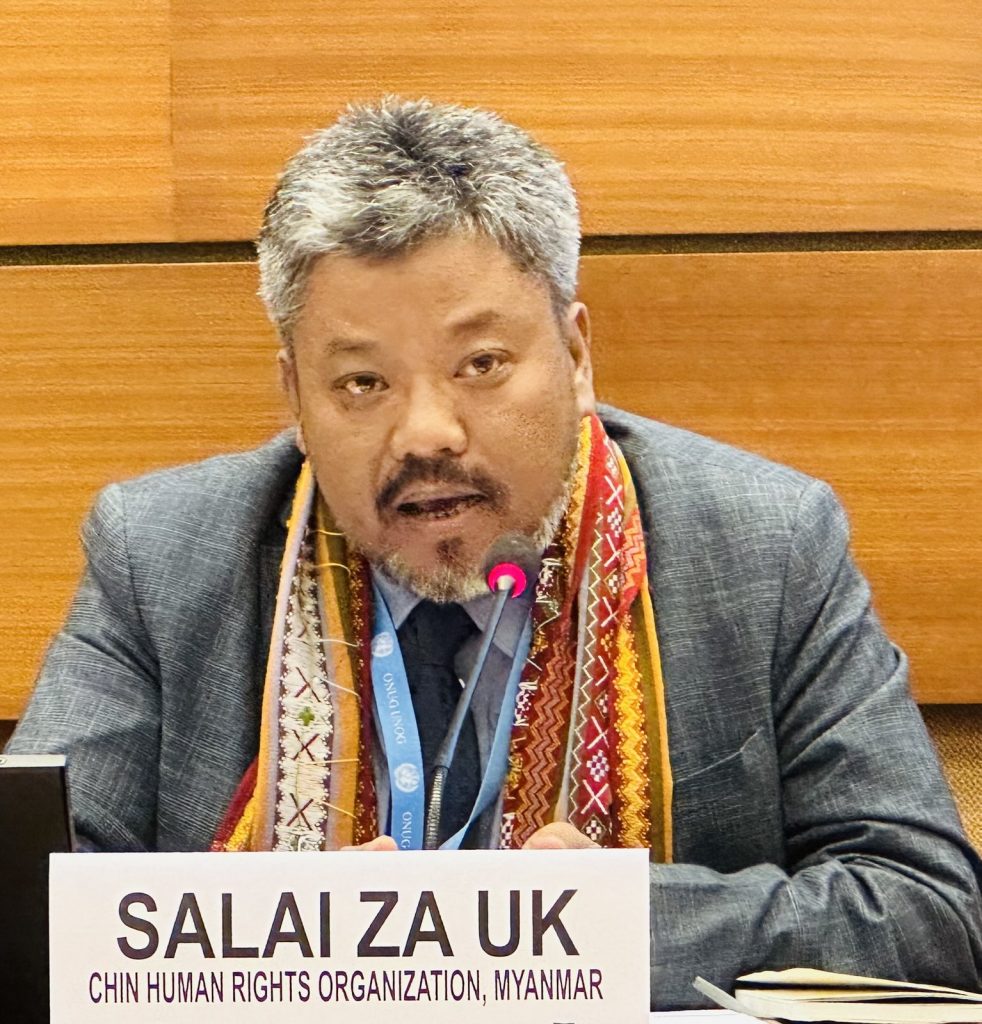
The establishment of the UN Human Rights Council (HRC) in 2006 created new opportunities for CHRO to raise the profile of the Chin people’s human rights concerns.
- Regular Submissions and Participation: CHRO regularly submitted reports and statements to HRC sessions, detailing ongoing human rights abuses in Chin State. CHRO representatives have actively participated in HRC sessions, often collaborating with other human rights organizations to highlight the broader human rights crisis in Burma. These efforts have contributed to multiple resolutions condemning the Burmese military’s actions.
- Advocacy on Religious Persecution: CHRO also played a critical role in raising awareness about the persecution of Christian Chin communities by the Burmese military and authorities, an issue that has been consistently highlighted in HRC discussions.
CHRO’s work at the HRC has ensured that the plight of the Chin people remains part of the broader international conversation about human rights in Myanmar.
3. Special Procedures and Special Rapporteurs

CHRO has engaged with multiple UN Special Procedures, including Special Rapporteurs and independent experts who focus on thematic and country-specific human rights issues.

- Special Rapporteur on the Situation of Human Rights in Myanmar: CHRO has provided valuable information to successive UN Special Rapporteurs on Myanmar, contributing to reports and statements that highlight violations in Chin State. These efforts have raised awareness of military abuses, forced labor, and religious persecution in the region.
- Special Rapporteur on Freedom of Religion or Belief: Given the Chin people’s predominantly Christian identity, CHRO has worked closely with this mandate holder to document and advocate against religious discrimination and persecution by the Burmese government.
- Other Thematic Special Procedures: CHRO has submitted reports and evidence to other UN Special Procedures, including those focusing on indigenous peoples, internally displaced persons, and extrajudicial executions, ensuring that the situation in Chin State is consistently highlighted in international forums.
4. Universal Periodic Review (UPR)
The Universal Periodic Review (UPR) process has been a key mechanism for CHRO’s advocacy at the UN.
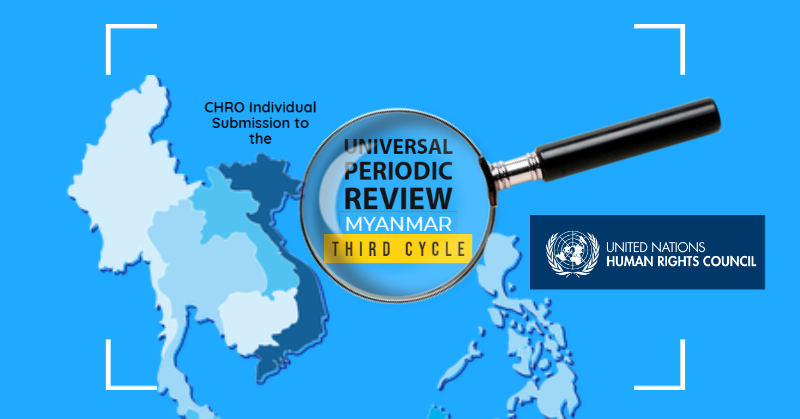
2011 and 2015 UPR Cycles: CHRO submitted stakeholder reports during the UPR of Myanmar, providing detailed accounts of human rights abuses in Chin State. These reports addressed issues such as forced labor, religious discrimination, and the impact of military rule on Chin communities.
2021 UPR Cycle: During the most recent UPR cycle, CHRO once again submitted detailed reports on the deteriorating human rights situation post-coup, focusing on military atrocities, displacement, and the shrinking space for civil society. The UPR process has provided CHRO with a platform to ensure that the concerns of the Chin people are addressed during Myanmar’s periodic human rights review.
5. Independent Investigative Mechanism for Myanmar (IIMM)
The creation of the Independent Investigative Mechanism for Myanmar (IIMM) in 2018 marked a significant step in efforts to hold Myanmar’s military accountable for human rights violations. CHRO has played a key role in providing evidence and documentation to the IIMM.
- Documentation of Atrocity Crimes: CHRO’s human rights documentation team has provided the IIMM with crucial evidence of war crimes, crimes against humanity, and other serious violations committed in Chin State. CHRO’s extensive network of human rights monitors on the ground has enabled it to gather and verify evidence that has been submitted to the IIMM for further investigation.
- Support for Accountability Mechanisms: CHRO’s contributions to the IIMM are part of broader efforts to ensure accountability for the Burmese military’s crimes. The organization has also supported universal jurisdiction cases filed in countries such as Indonesia and the Philippines, which seek to prosecute Burmese military leaders for their involvement in crimes against humanity.
6. Engagement with the International Labour Organization (ILO) on Forced Labor Issues
CHRO has had a long-standing engagement with the International Labour Organization (ILO), particularly on issues related to forced labor, a pervasive human rights violation in Burma.
- Documentation and Submissions: Since the early 2000s, CHRO has been documenting and submitting cases of forced labor in Chin State to the ILO, focusing on the widespread use of forced labor by the Burmese military. These submissions have provided the ILO with credible evidence of the military’s exploitation of Chin civilians for road construction, military portering, and other forms of forced labor.
- Awareness-Raising Programs: CHRO has conducted awareness-raising programs in Chin State and neighboring countries to educate Chin communities about their rights under international labor standards. These programs empowered local communities to recognize and resist forced labor practices, despite the oppressive environment created by the military regime.
- Testimony Before the ILO Commission of Inquiry: CHRO also contributed testimony before the ILO Commission of Inquiry on forced labor in Burma, sharing firsthand accounts and evidence of the military’s forced labor practices in Chin State. This testimony was critical in highlighting the extent of the problem and contributed to international pressure on the Burmese government to end forced labor.
- Contribution to the ILO’s Forced Labor Mechanism: CHRO’s collaboration with the ILO has contributed to a broader understanding of forced labor in Burma and has supported the ILO’s efforts to push for the elimination of forced labor practices. CHRO’s continued advocacy on this issue remains a vital part of its broader human rights agenda.
7. ECOSOC Special Consultative Status

In recognition of its work on human rights and labor issues, CHRO was granted ECOSOC Special Consultative Status by the UN Economic and Social Council in 2018. This status allows CHRO to participate in UN meetings, submit written statements, and make oral interventions, enhancing its capacity to influence international discussions on human rights in Burma.
Strategic Advocacy: With ECOSOC Special Consultative Status, CHRO has been able to organize side events at the Human Rights Council, engage with UN member states, and collaborate with other civil society organizations. This status has strengthened CHRO’s ability to advocate for the Chin people and other marginalized communities in Burma, particularly in the context of military abuses and forced labor.
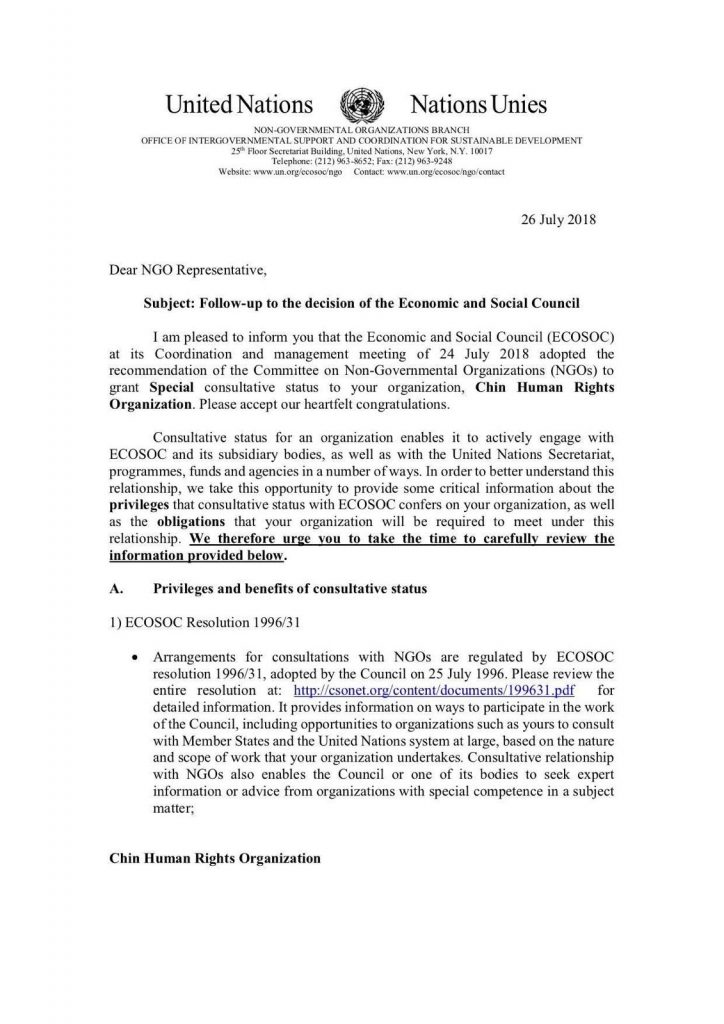
Over the course of its three-decade-long history, CHRO has built a strong and sustained engagement with the UN human rights system. From its early participation in the UN Working Group on Indigenous Populations and the Permanent Forum on Indigenous Issues to its current involvement with the Human Rights Council, Special Procedures, the Universal Periodic Review, the ILO, and the IIMM, CHRO has been at the forefront of advocating for the protection and promotion of human rights in Burma. CHRO’s ECOSOC Special Consultative Status has further empowered it to participate in global human rights advocacy, ensuring that the voices of the Chin people are heard at the highest levels of international decision-making.
